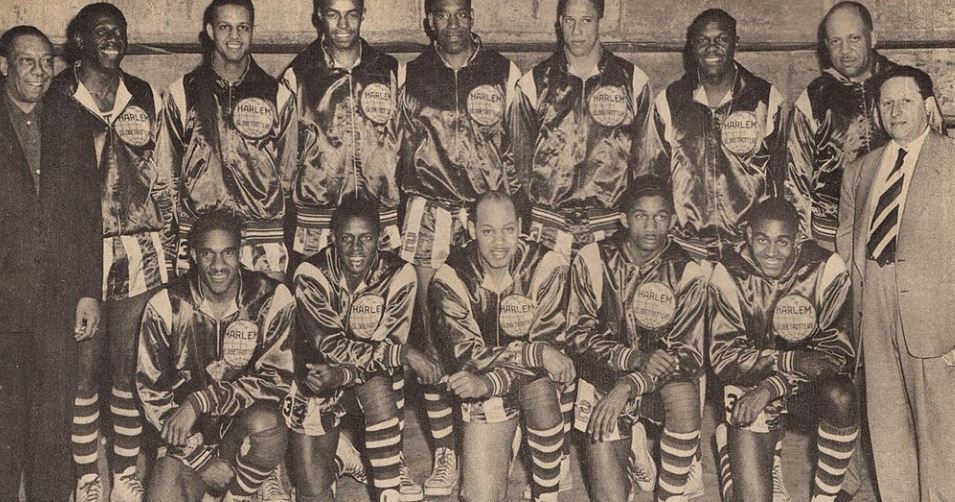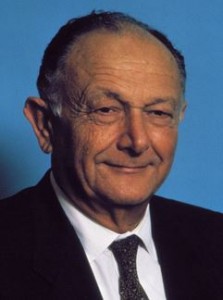 Abraham Michael Saperstein (1902-1966) was born in London and grew up in Chicago, the son of Polish-Jewish immigrants. From a young age, Saperstein was fascinated with sport, and played on his high school’s baseball, basketball, football, and boxing teams. Forced to drop out of university to support his struggling family, Saperstein never lost his dream of an athletic career, despite being just 5’3″ tall, and being a Jew in a time of rampant anti-Semitism. While working as a playground supervisor, Saperstein was given an opportunity to play for a semi-pro basketball team. He did well, and soon became the team’s coach, manager, and booking agent. In 1926, Saperstein founded his own basketball team, the Harlem Globetrotters.”Harlem” was not for its geographical location – it was based in Chicago – but because it was an all-black team. At the time, most sports leagues were for whites only, with separate leagues for black people. Basketball in particular was considered a “white sport”, with black players banned from the NBA. Saperstein and his original five players made just $8 (split evenly between them) in their first game. Throughout the difficult years of the Great Depression, Saperstein was the team’s coach, manager, driver, publicist, and even substitute player! The team was once described as “Four clean-limbed young colored men and a squat bandy-legged chap of Jewish extraction”. To make ends meet, the team had to play just about every night. Since most hotels did not allow black guests, Saperstein often snuck his players into his own room. The team quickly built a reputation for “ball-handling wizardry” and showmanship. In 1948, the Globetrotters played against the all-white NBA champions, the Minneapolis Lakers. To everyone’s shock, the Globetrotters won. A year later, they won a rematch. This proved once and for all that black players were just as good (if not better) than white players. The following year, the first black player (a former Globetrotter) was signed to an NBA team, finally breaking basketball’s colour barrier. That same year, the Globetrotters played in Madison Square Garden, the first time a basketball game sold out at MSG. Saperstein then established two more basketball teams in the US, as well as an international one. He also founded and owned several baseball teams. His ultimate wish was to own an NBA team, but he was thwarted time and again. Instead, he started his own competing league, the American Basketball League (ABL). To make it more exciting, Saperstein added a new line to the court and invented the three-point shot. The ABL did not last long, but the NBA soon adopted the three-point shot into its own league, forever changing the game. Saperstein was both a visionary and a tireless labourer. He took just one day off a year – Yom Kippur – and died of a heart attack while at work. Saperstein has been credited with revolutionizing basketball, making sports more entertaining, and most importantly, playing a key role in ending athletic racial segregation. One former player said the Globetrotters had “done more for the perception of black people, and the perception of America, than almost anything you could think of.” The Globetrotters still put on 450 shows a year, and have played over 26,000 exhibition games, in over 120 countries, making them one of the most popular and well-known basketball teams of all time.
Abraham Michael Saperstein (1902-1966) was born in London and grew up in Chicago, the son of Polish-Jewish immigrants. From a young age, Saperstein was fascinated with sport, and played on his high school’s baseball, basketball, football, and boxing teams. Forced to drop out of university to support his struggling family, Saperstein never lost his dream of an athletic career, despite being just 5’3″ tall, and being a Jew in a time of rampant anti-Semitism. While working as a playground supervisor, Saperstein was given an opportunity to play for a semi-pro basketball team. He did well, and soon became the team’s coach, manager, and booking agent. In 1926, Saperstein founded his own basketball team, the Harlem Globetrotters.”Harlem” was not for its geographical location – it was based in Chicago – but because it was an all-black team. At the time, most sports leagues were for whites only, with separate leagues for black people. Basketball in particular was considered a “white sport”, with black players banned from the NBA. Saperstein and his original five players made just $8 (split evenly between them) in their first game. Throughout the difficult years of the Great Depression, Saperstein was the team’s coach, manager, driver, publicist, and even substitute player! The team was once described as “Four clean-limbed young colored men and a squat bandy-legged chap of Jewish extraction”. To make ends meet, the team had to play just about every night. Since most hotels did not allow black guests, Saperstein often snuck his players into his own room. The team quickly built a reputation for “ball-handling wizardry” and showmanship. In 1948, the Globetrotters played against the all-white NBA champions, the Minneapolis Lakers. To everyone’s shock, the Globetrotters won. A year later, they won a rematch. This proved once and for all that black players were just as good (if not better) than white players. The following year, the first black player (a former Globetrotter) was signed to an NBA team, finally breaking basketball’s colour barrier. That same year, the Globetrotters played in Madison Square Garden, the first time a basketball game sold out at MSG. Saperstein then established two more basketball teams in the US, as well as an international one. He also founded and owned several baseball teams. His ultimate wish was to own an NBA team, but he was thwarted time and again. Instead, he started his own competing league, the American Basketball League (ABL). To make it more exciting, Saperstein added a new line to the court and invented the three-point shot. The ABL did not last long, but the NBA soon adopted the three-point shot into its own league, forever changing the game. Saperstein was both a visionary and a tireless labourer. He took just one day off a year – Yom Kippur – and died of a heart attack while at work. Saperstein has been credited with revolutionizing basketball, making sports more entertaining, and most importantly, playing a key role in ending athletic racial segregation. One former player said the Globetrotters had “done more for the perception of black people, and the perception of America, than almost anything you could think of.” The Globetrotters still put on 450 shows a year, and have played over 26,000 exhibition games, in over 120 countries, making them one of the most popular and well-known basketball teams of all time.
Words of the Week
He that waits upon Fortune, is never sure of a dinner.
– Benjamin Franklin

The 1950 Harlem Globetrotters team, with Saperstein at right


 Abraham Michael Saperstein (1902-1966) was born in London and grew up in Chicago, the son of Polish-Jewish immigrants. From a young age, Saperstein was fascinated with sport, and played on his high school’s baseball, basketball, football, and boxing teams. Forced to drop out of university to support his struggling family, Saperstein never lost his dream of an athletic career, despite being just 5’3″ tall, and being a Jew in a time of rampant anti-Semitism. While working as a playground supervisor, Saperstein was given an opportunity to play for a semi-pro basketball team. He did well, and soon became the team’s coach, manager, and booking agent. In 1926, Saperstein founded his own basketball team, the Harlem Globetrotters.”Harlem” was not for its geographical location – it was based in Chicago – but because it was an all-black team. At the time, most sports leagues were for whites only, with separate leagues for black people. Basketball in particular was considered a “white sport”, with black players banned from the NBA. Saperstein and his original five players made just $8 (split evenly between them) in their first game. Throughout the difficult years of the Great Depression, Saperstein was the team’s coach, manager, driver, publicist, and even substitute player! The team was once described as “Four clean-limbed young colored men and a squat bandy-legged chap of Jewish extraction”. To make ends meet, the team had to play just about every night. Since most hotels did not allow black guests, Saperstein often snuck his players into his own room. The team quickly built a reputation for “ball-handling wizardry” and showmanship. In 1948, the Globetrotters played against the all-white NBA champions, the Minneapolis Lakers. To everyone’s shock, the Globetrotters won. A year later, they won a rematch. This proved once and for all that black players were just as good (if not better) than white players. The following year, the first black player (a former Globetrotter) was signed to an NBA team, finally breaking basketball’s colour barrier. That same year, the Globetrotters played in Madison Square Garden, the first time a basketball game sold out at MSG. Saperstein then established two more basketball teams in the US, as well as an international one. He also founded and owned several baseball teams. His ultimate wish was to own an NBA team, but he was thwarted time and again. Instead, he started his own competing league, the American Basketball League (ABL). To make it more exciting, Saperstein added a new line to the court and invented the three-point shot. The ABL did not last long, but the NBA soon adopted the three-point shot into its own league, forever changing the game. Saperstein was both a visionary and a tireless labourer. He took just one day off a year – Yom Kippur – and died of a heart attack while at work. Saperstein has been credited with revolutionizing basketball, making sports more entertaining, and most importantly, playing a key role in ending athletic racial segregation. One former player said the Globetrotters had “done more for the perception of black people, and the perception of America, than almost anything you could think of.” The Globetrotters still put on 450 shows a year, and have played over 26,000 exhibition games, in over 120 countries, making them one of the most popular and well-known basketball teams of all time.
Abraham Michael Saperstein (1902-1966) was born in London and grew up in Chicago, the son of Polish-Jewish immigrants. From a young age, Saperstein was fascinated with sport, and played on his high school’s baseball, basketball, football, and boxing teams. Forced to drop out of university to support his struggling family, Saperstein never lost his dream of an athletic career, despite being just 5’3″ tall, and being a Jew in a time of rampant anti-Semitism. While working as a playground supervisor, Saperstein was given an opportunity to play for a semi-pro basketball team. He did well, and soon became the team’s coach, manager, and booking agent. In 1926, Saperstein founded his own basketball team, the Harlem Globetrotters.”Harlem” was not for its geographical location – it was based in Chicago – but because it was an all-black team. At the time, most sports leagues were for whites only, with separate leagues for black people. Basketball in particular was considered a “white sport”, with black players banned from the NBA. Saperstein and his original five players made just $8 (split evenly between them) in their first game. Throughout the difficult years of the Great Depression, Saperstein was the team’s coach, manager, driver, publicist, and even substitute player! The team was once described as “Four clean-limbed young colored men and a squat bandy-legged chap of Jewish extraction”. To make ends meet, the team had to play just about every night. Since most hotels did not allow black guests, Saperstein often snuck his players into his own room. The team quickly built a reputation for “ball-handling wizardry” and showmanship. In 1948, the Globetrotters played against the all-white NBA champions, the Minneapolis Lakers. To everyone’s shock, the Globetrotters won. A year later, they won a rematch. This proved once and for all that black players were just as good (if not better) than white players. The following year, the first black player (a former Globetrotter) was signed to an NBA team, finally breaking basketball’s colour barrier. That same year, the Globetrotters played in Madison Square Garden, the first time a basketball game sold out at MSG. Saperstein then established two more basketball teams in the US, as well as an international one. He also founded and owned several baseball teams. His ultimate wish was to own an NBA team, but he was thwarted time and again. Instead, he started his own competing league, the American Basketball League (ABL). To make it more exciting, Saperstein added a new line to the court and invented the three-point shot. The ABL did not last long, but the NBA soon adopted the three-point shot into its own league, forever changing the game. Saperstein was both a visionary and a tireless labourer. He took just one day off a year – Yom Kippur – and died of a heart attack while at work. Saperstein has been credited with revolutionizing basketball, making sports more entertaining, and most importantly, playing a key role in ending athletic racial segregation. One former player said the Globetrotters had “done more for the perception of black people, and the perception of America, than almost anything you could think of.” The Globetrotters still put on 450 shows a year, and have played over 26,000 exhibition games, in over 120 countries, making them one of the most popular and well-known basketball teams of all time.

